Canada offers permanent residency for C’bean temporary workers, graduates
OTTAWA:
International graduates and healthcare workers, including Caribbean nationals working in Canada, could be granted permanent residency under special public policies, featuring additional streams for application, the country’s immigration minister announced recently.
Canada’s Minister of Immigration, Refugees and Citizenship, Marco E. L. Mendicino, announced on Wednesday what he describes as “an innovative pathway” to permanent residency for over 90,000 essential workers and international graduates, including Caribbean nationals, who are actively contributing to Canada’s economy.
Mendicino said these special public policies will grant permanent status to temporary workers and international graduates who are already in Canada, and who possess the skills and experience that the country need to fight the pandemic and accelerate economic recovery.
“The focus of this new pathway will be on temporary workers employed in our hospitals and long-term care homes, and on the frontlines of other essential sectors, as well as international graduates who are driving the economy of tomorrow,” he said.
To be eligible, Mendicino said workers must have at least one year of Canadian work experience in a healthcare profession or another pre-approved essential occupation.
International graduates must have completed an eligible Canadian post-secondary program within the last four years, and no earlier than January 2017, he said.
Additional streams
Effective May 6, Mendicino said Immigration, Refugees and Citizenship Canada (IRCC) will begin accepting applications under three streams: 20,000 applications for temporary workers in health care; 30,000 applications for temporary workers in other selected essential occupations; and 40,000 applications for international students who graduated from a Canadian institution.
The immigration minister said the streams will remain open until November 5, 2021, or until they have reached their limit.
Up to 90,000 new permanent residents will be admitted under these three streams, Mendicino said.
To promote Canada’s official languages, he said three additional streams with no intake caps have also been launched for French-speaking or bilingual candidates.
“Communities across Canada benefit from French-speaking and bilingual newcomers, and this pathway will contribute to the vitality of these Francophone minority communities,” Mendicino said.
“With an accelerated pathway to permanent residency, these special public policies will encourage essential temporary workers and international graduates to put down roots in Canada and help us retain the talented workers we need, particularly in our healthcare system,” he added.
Drive long-term growth
“Today’s announcement will help us achieve our 2021 Immigration Levels Plan, which will see Canada welcome 401,000 new permanent residents. The skilled newcomers and international graduates welcomed under our plan will help create jobs and drive long-term growth in Canada,” Mendicino continued.
“The pandemic has shone a bright light on the incredible contributions of newcomers,” he said. “These new policies will help those with a temporary status to plan their future in Canada, play a key role in our economic recovery and help us build back better. Our message to them is simple: your status may be temporary, but your contributions are lasting – and we want you to stay.”
IRCC said that these public policies apply to workers in 40 healthcare occupations, as well as 95 other essential jobs across a range of fields, like caregiving, and food production and distribution.
IRCC said graduates and workers must have proficiency in one of Canada’s official languages; meet general admissibility requirements; and be present, authorised to work and working in Canada at the time of their application to qualify.

